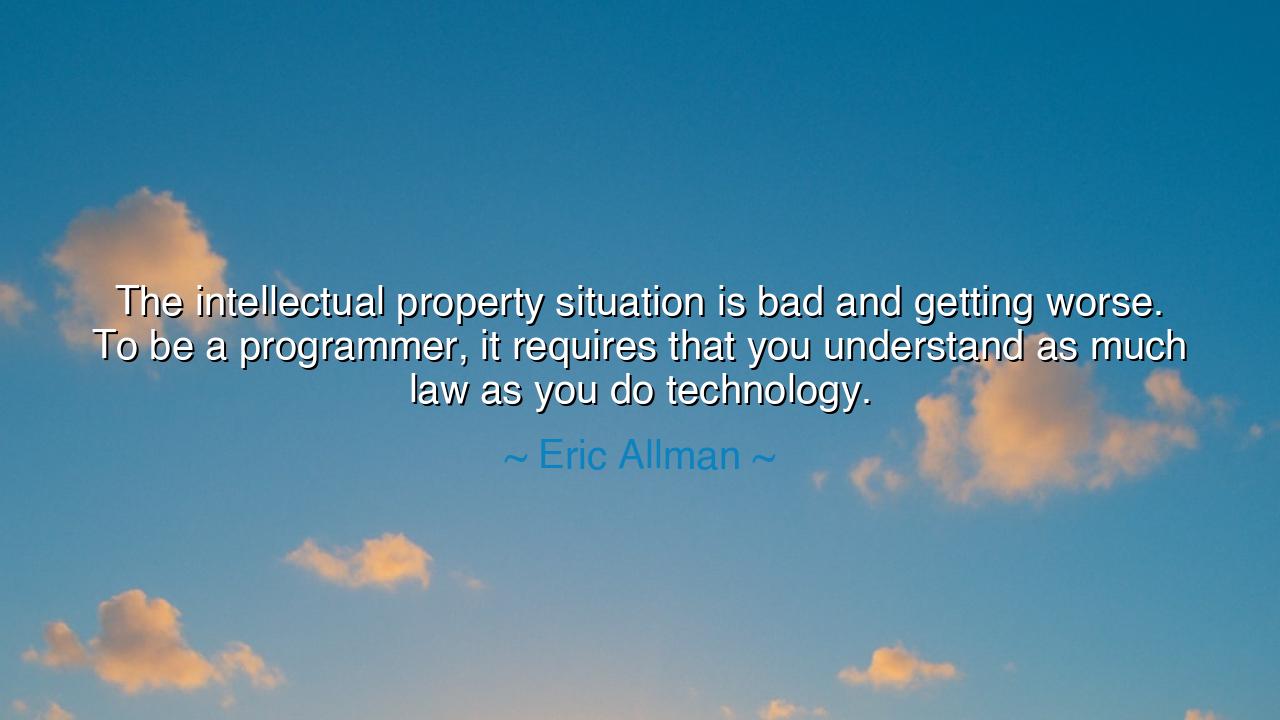
The intellectual property situation is bad and getting worse. To
The intellectual property situation is bad and getting worse. To be a programmer, it requires that you understand as much law as you do technology.






Hear the words of Eric Allman, spoken with lament and gravity: “The intellectual property situation is bad and getting worse. To be a programmer, it requires that you understand as much law as you do technology.” In these lines, there is both a cry of frustration and a warning to all who labor in the realm of creation. For once, the craftsman’s burden was only the mastery of his art. But now, in this age of patents and contracts, of ownership and restriction, the creator is entangled not only in the work of the mind, but in the snares of law.
Intellectual property was conceived to protect invention, to shield the fruits of the mind from theft, and to encourage innovation by granting the laborer his rightful reward. Yet, as Allman warns, what was meant as protection has grown into a labyrinth. It binds the hands of the very ones it was meant to liberate. The programmer, once free to build, share, and refine, now stands constantly at risk of trespassing upon invisible boundaries—codes of law that weigh as heavily as the codes of the machine. What once was a field of pure discovery now requires the vigilance of a lawyer’s eye.
The ancients too faced such struggles, though in different forms. In the guilds of medieval Europe, artisans sought to guard their secrets through oaths and rules, restricting entry to outsiders. Knowledge was locked away, and innovation slowed, for fear of theft outweighed the desire to share. The printing press too, though a gift of knowledge, was quickly chained by censors and legal decrees. The pattern is eternal: the tools that empower the mind often bring with them the chains of regulation. Allman’s words echo this cycle, reminding us that today’s technology, like yesterday’s press or forge, is caught in the struggle between freedom and control.
Consider also the story of Nikola Tesla. A man of staggering genius, he dreamed of a world electrified, wireless, and free. Yet he was ensnared in endless legal battles with Thomas Edison and others, who fought not over the dream itself, but over the ownership of ideas. While Tesla sought to give, others sought to claim. His work, slowed and bound by disputes, shows us how law can shape, distort, or even strangle technology when the balance tilts from justice to greed.
Thus, Allman’s warning is not only for programmers, but for all creators. If the artist must study contracts, if the inventor must fear lawsuits, if the builder must spend as much time in courts as in workshops, then the spirit of innovation itself is wounded. A society that burdens its makers with endless law risks extinguishing the very fire that drives progress. The delicate balance between protection and freedom must be guarded, lest creation wither under the weight of ownership.
The lesson for us is clear: we must cultivate wisdom in both craft and governance. The creator must strive to understand the rules of the age, but the rulers must also ensure that these rules do not stifle creation. For technology is not merely a commodity, but the breath of progress, the torch of civilization. If that torch is dimmed by endless entanglements, the world will stumble in shadow.
Practical wisdom stands before you: If you are a programmer, learn not only the art of code, but also the boundaries of law that shape your work. Protect your creations, but do not hoard them so tightly that innovation dies. If you are a leader or guardian of law, remember that rules must serve the people, not suffocate them. Let intellectual property be a shield, not a prison; a guide, not a chain.
So let Allman’s words be heeded as prophecy: when creators must be lawyers to survive, the age of innovation is endangered. Let us strive for a balance where technology and law walk together, each serving the higher purpose of human flourishing. For only then will the spark of creation burn brightly, lighting the path for generations yet unborn.






AAdministratorAdministrator
Welcome, honored guests. Please leave a comment, we will respond soon